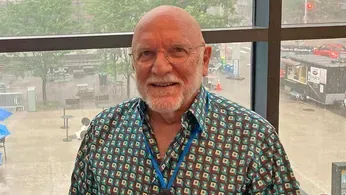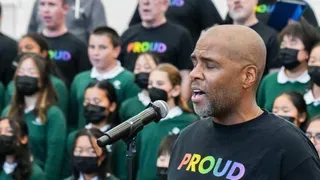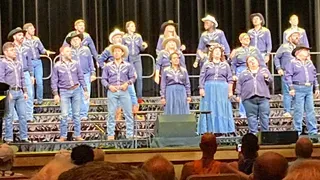
July 10, 2024
Blogging GALA: Part One
Kilian Melloy READ TIME: 5 MIN.
Walking around the Minneapolis downtown area near the Convention Center, it's plain to see that the city has made an effort to extend a welcome to the LGTBQ+ choruses attending this year's GALA Festival: Decals on the sidewalk celebrate the event; banners on light poles shout out to the different individual choruses that are in attendance; rainbow flags flutter overhead, and rainbow stripes garnish hotels.
It's in this setting that I had the chance to interview Dr. Timothy Seelig, Conductor Laureate of the San Francisco Gay Men's Chorus and Conductor Emeritus of the Turtle Creek Chorale. We met just after Dr. Seelig wrapped up shooting video clips that will be integrated into the livestream of this year's gathering of more than 200 LGTBQ+ choruses from around the country and the world.
An every-four-years event, the GALA Festival – known colloquially as GALA – brings together people from across the LGTBQ+ spectrum. (GALA stands for The Gay and Lesbian Association of Choruses.) For six days the 7,000 singers in attendance here will perform their music, come together for shared interests – workshops, vocal training classes, gatherings of like-minded people – and mill around town, congregating in the restaurants and communal spaces, sitting in the auditoriums of the Minnesota Convention Center and at Orchestra Hall, among other venues.
This year's celebration also marks a fresh milestone: For the first time in its four-decade history, GALA moves into the digital realm, extending the experience to others who can't be here in the moment.
"And, more importantly," Dr. Seelig stressed, "you can still get the live stream after it's over" – thereby making indelible memories even more so for those who are here in person.
"It will be available on the GALA website, and it's 150 events for $35. It's insane!" Dr. Seelig exclaimed. "It's more than 100 hours of entertainment. And the thing about live streaming is, you have fast forward!" With a laugh, he added: "How fun is that you're not gonna have to run across the plaza to see another chorus?"
No, indeed, viewers of the livestream won't have to dash anyplace, and they won't have to make aggravating choices when two or more events they want to see are scheduled for the same time – a perpetual dilemma for GALA participants in real time.
Dr. Seelig mentions just such a dilemma that awaits this year's GALA crowd. "The San Francisco Gay Men's Chorus and the Turtle Creek Chorale, which are popular for attendees, and are scheduled at the same time as New York City!"
Before the livestream option, choosing one would inevitably mean missing out on the others. Not any longer!
Dr. Seelig came to the San Francisco Gay Men's Chorus in 2010 after a long and highly successful career leading queer choruses, starting with the Turtle Creek Chorale in Dallas. His Turtle Creek tenure saw him debut at Carnegie Hall, author books on vocal technique, and feature in a documentary; his eleven and a half years with the SFGMC saw him continue that impressive trajectory of accomplishments.
Dr. Seelig passed the baton – literally – in 2022, two years after what would have been his final GALA as the conductor of the San Francisco Gay Men's Chorus had the COVID pandemic not caused a delay – and, ultimately, cancellation – of that edition of the festival.
Asked if retirement has changed his view of GALA, Dr. Seelig responded, "Definitely, it's changed my feelings, specifically because I'm no longer conducting, so I don't have all the nerves of getting the tech rehearsal on time and making sure they're wearing the right bow ties, or whatever. All that stuff that comes down to the director."
I asked Dr. Seelig how the LGTBQ+ Choral movement had changed in the decades since he and others pioneered it.
"Oh my gosh," he said. "I started in 1986, and 1989 was my first GALA. Obviously, it was gay male-centric. There was one women's chorus from San Diego, and I was moved at that. We were all just sitting there, and as a surprise, the San Diego Men's Chorus, halfway through, brought on the San Diego women's chorus, and they sang together. Everybody is weeping, because we were in the middle of the AIDS crisis, and the women were taking care of us at home, and all of a sudden here they were, singing together. I went home and co-founded the Women's Chorus of Dallas, because I was, like, "We have to have that in our community'."
Change was slow at the start, he recalled. "but then the whole thing has changed in the last 10 years." And not just because there are women's choruses and mixed choruses now, but also because there's been an expansion in who is included in the choral movement overall – a "huge shift in terms of non-binary, trans, and BIPOC" representation, Dr. Seelig noted.
Knowing what he knows now, I asked, if he could give his younger self some advice, what would that advice be?
"I often think if I had to do it all over again, I would have been a lot calmer," Dr. Seelig reflected. "By nature, I'm an overachiever: Type A, driven. Not everybody wanted to be driven, and it didn't matter to me; we were on the cutting edge of pushing the gay choral movement into the world. And we're gonna perform at ACDA [American Choral Director's Association], we're gonna make recordings of German repertoire, or whatever... I didn't have to do that. I would have relaxed and been a little less aggressive, and I would have worked less.
"I think my children suffered," Dr. Seelig continued. "I was like, 'Look, if I take my kids to rehearsal, it's like they're being with me.' No, it's not like being with you. That is not spending time with your children when they're sitting over there coloring during a three-hour rehearsal. I would do that differently for sure. You can still be an overachiever, but not foist it on everyone around you to their detriment."
I suggested that this must be a tough balance to find, since I got the impression that Dr. Seelig is something of a perfectionist.
"I am a complete perfectionist," Dr. Seelig acknowledged. Even so, he pointed to a crucial paradox in his long career: "People kept saying, 'Why don't you have professional singers in the chorus, people that you're paying to do this and put up with you?' I never wanted a professional ensemble. My greatest goal ever was to take a bunch of amateurs of wide variety in talent and capability, and make the best out of them that I possibly could. We didn't have sight reading at the auditions, because my job is to teach people music, and to teach them how to sing, and hopefully sing together at the same time.
"I've always loved working with amateurs. It's been the joy of life to be doing that."
I asked about the way things have changed for LGTBQ+ people, and how the choral movement could best remain relevant.
"For my 37 years [of being involved with the LGBTQ+ choral movement], that is the one question that is constant," Dr. Seelig told me. "'Are gay choirs still relevant?' And it's a fairly simple answer. Teenagers are still killing themselves. Adults are still thrown out of their families when they come out. Until such time as that doesn't happen anymore, yeah, we should sing. We should sing every opportunity we have, and proclaim loudly who we are. The more we do that, the better chances are for the kids. Now we're on YouTubes and on the internet. They could watch our concerts."
As of this year's GALA, they can do more than just watch concerts one at a time. Now they can watch a whole five-day event involving 7,000 queer singers raising their voices, making music, and insisting to the world that not only do we have a fundamental right to be here; it's an out and out beautiful thing that we are.
Kilian Melloy serves as EDGE Media Network's Associate Arts Editor and Staff Contributor. His professional memberships include the National Lesbian & Gay Journalists Association, the Boston Online Film Critics Association, The Gay and Lesbian Entertainment Critics Association, and the Boston Theater Critics Association's Elliot Norton Awards Committee.




